As you may have noticed, I’ve been making some changes to Piddleville recently. It’s window dressing, essentially, although I did manage to get around to something I’ve been meaning to do for some time.
Crawford and Gable and the oddball Strange Cargo
I stumbled upon Strange Cargo last night and rarely has the word “strange” in a title been used so appropriately. This movie is strange indeed. It’s also a pretty good adventure film starring Joan Crawford and Clark Gable (the latter’s previous movie was Gone With the Wind).
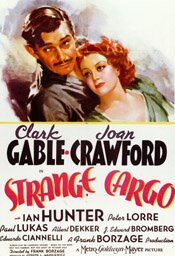 Strange Cargo (1940)
Strange Cargo (1940)
Directed by Frank Borzage
Crawford and Gable are two feisty lovers with a stormy relationship. Neither is a person of outstanding character. The storminess was likely easy for both to convey because in reality the pair, who had a prior relationship, detested one another.
In the movie, Crawford is essentially a hooker (though Hollywood censorship of the period means this is only vaguely suggested). Gable is a nasty, self-centered rogue who manages to be charming at the same time.
We find them on Devil’s Island (French Guiana) where they get mixed up with a group of convicts in an escape attempt. The majority of the movie is the struggles and conflicts of this rag tag bunch as they make their way through the jungle and swamps of the island and then on board a small ship as they try to get away.
Fine enough, and a pretty de rigueur setting for an adventure of the period. But there is an element in the movie that makes it anything but de rigueur. That element is the character of Cambreau, played by Ian Hunter. He appears mysteriously and joins the convicts in their escape but he is not your usual prisoner.
Cambreau is a Christ-like figure that steers the movie into religious allegory and allows the film to meditate on subjects like God, morality, ethics and honour. While this may not sound appealing (and yes, occasionally it is a little heavy-handed), the mysterious quality Hunter’s Cambreau figure brings adds to the adventure.
Gable, by the way, objected to this aspect of the movie. He thought it would prompt audiences to stay away. In his opinion, people expected love and sex in a Crawford-Gable movie.
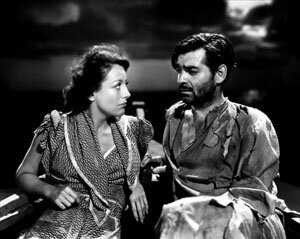
Both Crawford and Gable are wonderful in the movie, particularly Crawford as the slatternly Julie. I read somewhere that Crawford was quite proud of the way she put her “star” image aside and portrayed the character. I noticed how in many scenes she adds small, subtle touches to communicate the character’s “low rent” status, such as one scene where it is in how she sits (not what my mother would have called “lady-like”.)
She also went without makeup or false eyelashes and her costume, essentially two dresses, was from a bargain boutique.
Gable is equally unglamorous in his appearance, wearing torn clothes and growing increasingly unshaven as the movie progresses. In fact, the movie appears to make a concerted effort to ensure both its stars are unstar-like, visually.
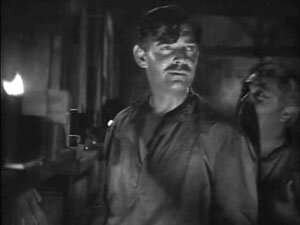
The end result is a movie that is peculiar yet compelling, partly due to its oddness. The Cambreau character, while bringing in the religious element, also adds mystery to the overall adventure as no one ever quite knows who he is.
On the other hand, some scenes aren’t subtle in communicating the Christ figure aspect, such as the scene near the end when Cambreau is in the stormy waters with his arms out, as if on a cross.
Yes, Strange Cargo is an odd movie. But it’s worth seeing at least once, especially if you’re a Gable or Crawford fan.
An aside … According to Warren Harris in Clark Gable: A Biography, this movie was made at a time when “Joan Crawford, whose box-office popularity had sunk an all-time low, had talked L.B. Mayer into teaming them (Gable and Crawford) for the first time since the 1936 Love On the Run, which was also Crawford’s last hit.”
Chess games and submarine movies
You might think that movies set on submarines are relatively rare. They are — relatively. But as a quick search online will show you (as it just showed me), there are actually quite a few of them. (Das Boot and Crimson Tide come to mind.) Relative to other movies, they may be rare. But there are quite a few of them nonetheless.
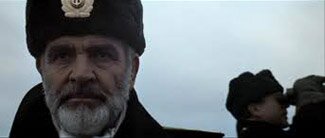 This leads me to the two movies I wanted to bring up: Run Silent, Run Deep (1958) and The Hunt for Red October (1990). I don’t know what the correct term for describing them would be — suspense, thriller, action? I lean toward suspense but what makes them compelling is a phrase Sean Connery’s character, Marko Ramius, uses in Red October: chess game.
This leads me to the two movies I wanted to bring up: Run Silent, Run Deep (1958) and The Hunt for Red October (1990). I don’t know what the correct term for describing them would be — suspense, thriller, action? I lean toward suspense but what makes them compelling is a phrase Sean Connery’s character, Marko Ramius, uses in Red October: chess game.
There is more actual “action,” as in torpedoes and so on, in Run Silent, Run Deep, but neither film has a great deal of it. It’s the drama of the situations and, again in both films, the mystery surrounding a lead character’s motives, Clark Gable’s in Run Silent and Sean Connery’s in Red October.
Both movies get more physically and visually dramatic with action in their final acts but for the most part these chess games are mysteries rather suspense thrillers, though both are suspenseful and, I suppose, thrilling.
However they are described, I like both movies quite a lot and have watched both many times. They are well worth seeing more than once ….
Run Silent, Run Deep (1958)
I saw an interview with the actor Laurence Fishburne the other day in which he was speaking of various influences when he was young. At one point, he brought up the movie Run Silent, Run Deep and Clark Gable. What struck him in the movie was Gable’s gravitas. I immediately thought, “Yes, that is the perfect word for it.” (Read more)
The Hunt for Red October (1990)
In the class of movies known as action-adventure, The Hunt for Red October stands out as one of the best and as one of the strangest because the action is relatively minimal and doesn’t play a huge role in generating the film’s suspense and tension. (Read more)
Guy movie with Gable and gravitas
I’m always astonished when I notice the movies Robert Wise has been involved with, particularly as director. I tend to think of him as a “meat and potatoes” kind of director because I don’t notice him. His movies never draw attention to themselves as movies; they’re simply stories told well.
As an editor, he worked with Orson Welles on Citizen Kane. As director, he’s done movies like The Sound of Music, The Haunting, West Side Story (as co-director) and the movie below, Run Silent, Run Deep.
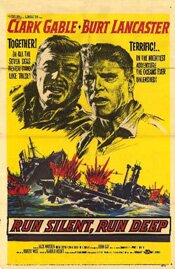 Run Silent, Run Deep (1958)
Run Silent, Run Deep (1958)
Directed by Robert Wise
I saw an interview with the actor Laurence Fishburne the other day in which he was speaking of various influences when he was young. At one point, he brought up the movie Run Silent, Run Deep and Clark Gable. What struck him in the movie was Gable’s gravitas. I immediately thought, “Yes, that is the perfect word for it.”
Fishburne brought this up because Gable would have been in his late 50s when he made the film.
He was not playing the young, dashing, romantic figure of movies like Gone With the Wind. And he wasn’t playing the great white hunter of Mogambo, made only five years earlier.
He does, however, play a “manly man,” which would have had great appeal for him, from the little I know of Gable.
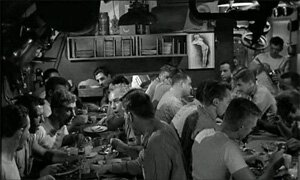 Run Silent, Run Deep is a guy movie. There are really only two female roles in the movie: a very small part as Gable’s wife (Mary LaRoche) and a pin-up poster. It’s all guys and for the most part they are confined in a submarine. Despite that, it’s a good movie. Actually, it is because of that it is a good movie. It knows what it is about and its focus doesn’t waver.
Run Silent, Run Deep is a guy movie. There are really only two female roles in the movie: a very small part as Gable’s wife (Mary LaRoche) and a pin-up poster. It’s all guys and for the most part they are confined in a submarine. Despite that, it’s a good movie. Actually, it is because of that it is a good movie. It knows what it is about and its focus doesn’t waver.
Gable is submarine Commander Richardson, a man who, as we see in the opening scenes, loses the sub he commands when it is sunk by a Japanese destroyer, one that acquires a kind of legendary status because it is so successful in sinking U.S. subs. (The movie is set during World War II.)
After a long wait, Richardson gets another command (one he has specifically gone after). Unfortunately, that sub’s crew thinks their first officer, Lieutenant Jim Bledsoe (Burt Lancaster) is getting the command, as does Bledsoe. When Richardson comes aboard to take over, it is to a resentful crew and first officer.
Things don’t improve when he makes the crew go through the same drill repeatedly, obsessed with shaving seconds off the time it takes to dive and launch torpedoes. It further degrades when this new commander appears to avoid going after Japanese ships. It strikes the crew as cowardly.
It turns out the commander has plans: against orders, he intends to take the sub into dangerous waters and sink the unsinkable ship that is taking out all the U.S. subs, including Commander Richardson’s previous submarine.
It’s a simple, direct story and won’t ever be accused of being overly sophisticated. But it’s virtue is its simplicity and directness. Director Robert Wise has left nothing necessary out and has put nothing unnecessary in.
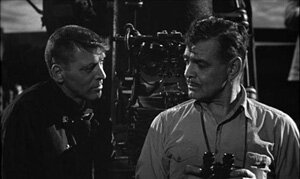 Gravitas, like the word gravity, comes from the Latin word “gravis” which means seriousness or weightiness. Gable communicates it wonderfully. Lancaster does to a degree too, though in a different way. Between the two actors, you get a nicely dramatic contrast.
Gravitas, like the word gravity, comes from the Latin word “gravis” which means seriousness or weightiness. Gable communicates it wonderfully. Lancaster does to a degree too, though in a different way. Between the two actors, you get a nicely dramatic contrast.
Gable, outside moments of command, speaks in a drawling, friendly manner. In moments of command, he’s brusque and direct. Lancaster, on the other hand, with his character’s resentment, speaks in a clipped fashion. He also communicates a sense of simmering anger that only his naval discipline keeps in control.
It’s the dynamic between the two characters that really propels this movie, though a straightforward, determined plot nicely aids it.
I’ve seen this movie several times over the years and have liked it every time. Initially, I was a young boy and thought it was cool because it had submarines and torpedoes. Grown up, I like it because it is just a good, well told story.
The combustible Ava Gardner – review
Ava Gardner: ‘Love is Nothing’ (2006)
by Lee Server
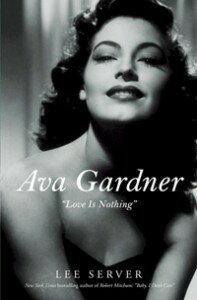 I recently finished reading Ava Gardner: “Love Is Nothing” by Lee Server and it’s nothing if not entertaining. Somewhere, he makes mention of her living life “like a rocket.”
I recently finished reading Ava Gardner: “Love Is Nothing” by Lee Server and it’s nothing if not entertaining. Somewhere, he makes mention of her living life “like a rocket.”
It’s an apt description but I think I’d say she lived like she drove cars – fast, carefree and just a little bit out of control (and with more than a few crashes).
It really is an extraordinary life and, if the end has a bit of sadness to it, it should be seen in context. Her highs were very high and the lows – well, very low. It strikes me as a life characterized by extremes.
I found the biography very good and, as one reviewer mentioned (I can’t remember who it was), while Server details the good and the bad he does appear to have an affection for his subject. But then, really, who didn’t? One thing the biography makes fairly clear is how easily most people found Ava to like, even to love.
And yes, the book covers all the marriages and the affairs and, good grief, there were a helluva a lot of them.
As for her film work, one thing that comes across (for me, at least) is how much we missed of some fine acting – for several reasons. In part, a studio that seemed incapable or indifferent to placing her in good roles, and also Ava’s own insecurities and capriciousness. She was better than she knew, better than the studio allowed her to be and so she probably never achieved what she might have on film.
We do, however, have Ava Gardner in some gems, like The Killers and (my favourite) The Night of the Iguana. (Server often mentions the film Pandora and the Flying Dutchman and, while Gardner is quite fine in the film, as is James Mason, the movie as a movie is a bit of a turkey.)
If I have any objection to the biography I think it is that an explanation for the kind of personality Ava Gardner had may be absent, though I’m not sure anyone could actually explain what went into making Ava Gardner. This is not to say the book omits anything or is remiss in anyway. But she seems to have experienced major swings in mood (many, I would imagine, caused by alcohol – she was, I think, an alcoholic, taking it in like water). She was also plagued by insecurities.
And really, what explains that relationship with Sinatra? Alcohol and combustible personalities … It’s an explanation but I’m not sure that fully accounts for it.
Whatever the reasons, Ava Gardner’s life is utterly fascinating. And perhaps more than just the endless incidents and relationships, it may be its inexplicable quality that makes it most compelling.
Also see:
Reading about Clark Gable, movie star
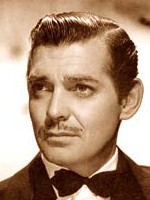 I’m currently reading Clark Gable: a Biography by Warren G. Harris. While not great, it’s certainly pretty good. I’m almost finished it and I have to be honest, what I find most interesting is how uninteresting Clark Gable is.
I’m currently reading Clark Gable: a Biography by Warren G. Harris. While not great, it’s certainly pretty good. I’m almost finished it and I have to be honest, what I find most interesting is how uninteresting Clark Gable is.
Perhaps a more rigorous biography might have helped this – a bit more psychological focus, assuming there is sufficient information available to do that.
The book itself is interesting enough, but it just seems a bit odd that someone of that “star” stature should be so … well, bland. But perhaps that’s the real story of Gable – a huge success in that Hollywood world, yet really just an average guy.
Of course, I should also say that while I’ve never disliked Clark Gable movies, and there are few I like quite a lot (Gone With the Wind and Run Silent Run Deep, for instance) I’ve never been a huge fan of his.


